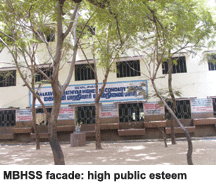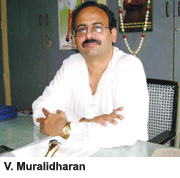This unaided K-12 school is a unit of the Sevalaya Charitable Trust, registered by former TCS engineer V. Muralidharan to provide shelter, medical care and education to orphan children and senior citizens
 Sited on a 13-acre eco-friendly campus in Kasuva village, 40 km west of Chennai, the Mahakavi Bharathiyar Higher Secondary School (MBHSS, estb.1991) has won public acclaim and admiration for offering free-of-charge quality education to orphans and destitute children. This unaided Tamil medium K-12 school affiliated with the Tamil Nadu State Board of Education (TNSBE) was promoted by the Chennai-based Sevalaya Charitable Trust (SCT), registered by software engineer V. Muralidharan and some friends in 1988 to provide shelter, medical care and education to orphan children and senior citizens bereft of support systems.
Sited on a 13-acre eco-friendly campus in Kasuva village, 40 km west of Chennai, the Mahakavi Bharathiyar Higher Secondary School (MBHSS, estb.1991) has won public acclaim and admiration for offering free-of-charge quality education to orphans and destitute children. This unaided Tamil medium K-12 school affiliated with the Tamil Nadu State Board of Education (TNSBE) was promoted by the Chennai-based Sevalaya Charitable Trust (SCT), registered by software engineer V. Muralidharan and some friends in 1988 to provide shelter, medical care and education to orphan children and senior citizens bereft of support systems.
Since it admitted its first batch of 30 children in 1991, MBHSS has gone from strength to strength and currently the K-12 school has 1,200 students instructed by 60 teachers on its muster rolls. Though most students are first generation learners from socio-economically deprived households, the school has consistently achieved 90-100 percent pass percentages in the class X and XII examinations of TNSBE with more than half the students securing first class and/or distinction. Every year 20 higher secondary school leavers are admitted into one of Anna University’s four engineering colleges.
 The high public esteem the school enjoys is attributable to its visionary promoter V. Muralidharan, an alumnus of Madras University and Indian Institute of Science, Bangalore, who rose to the position of principal consultant during a 22-year career with India’s premier information technology corporate Tata Consultancy Services (TCS). Inspired by India’s three great leaders — revolutionary Tamil poet Mahakavi Bharathiyar, Mahatma Gandhi and Swami Vivekananda — while a young TCS employee, Muralidharan constituted the Sevalaya Charitable Trust in 1988. “At the age of 11, I read a poem of Bharathiyar which says that the true meaning of Saraswathi pooja lies in starting schools in places where there are none, and providing free education to the poor as opposed to chanting mantras. Bharathiyar is the primary inspiration behind Sevalaya,” says Muralidharan.
The high public esteem the school enjoys is attributable to its visionary promoter V. Muralidharan, an alumnus of Madras University and Indian Institute of Science, Bangalore, who rose to the position of principal consultant during a 22-year career with India’s premier information technology corporate Tata Consultancy Services (TCS). Inspired by India’s three great leaders — revolutionary Tamil poet Mahakavi Bharathiyar, Mahatma Gandhi and Swami Vivekananda — while a young TCS employee, Muralidharan constituted the Sevalaya Charitable Trust in 1988. “At the age of 11, I read a poem of Bharathiyar which says that the true meaning of Saraswathi pooja lies in starting schools in places where there are none, and providing free education to the poor as opposed to chanting mantras. Bharathiyar is the primary inspiration behind Sevalaya,” says Muralidharan.
From humble beginnings in a rented home with five orphan children at Sivanvoil village, utilising his vantage position in this fast-track IT multi-national, Muralidharan (with the support and encouragement of the TCS manage-ment) has transformed SCT into a child education, animal welfare, and old people’s home which attracted dona-tions aggregating Rs.3 crore in the year 2009-10 from individuals, IT profess-ionals and corporates worldwide.
Moreover taking a cue from Mahatma Gandhi who believed in improving living standards in village India, the trust founded the Mahatma Gandhi Health Centre (1993) which provides free healthcare for people from neighbouring villages. Subsequently in 1995, the Swami Vivekananda hostel and library was established to follow the teaching of Vivekananda that true divinity lies in feeding hungry people. To attain greater self sufficiency, SCT started a gaushala in the year 2000 with 40 cows providing milk to children and inhabitants of Kasuva; promoted a crafts training centre for village women; and in 2002 established the Sri Ramakrishna Paramahansa Old Age Home for destitute senior citizens.
The first school to be established in Kasuva village (pop: 3,000), MBHSS is distinct in many ways. An innovative sui generis K-12 institution, the school has given a totally new dimension to education by designing a special BGV (Bharathiyar, Gandhi and Vivekananda) syllabus for secondary and higher secondary students, which integrates the values and teachings of these great philosopher saints. “The works of these leaders are woven into the curriculum and students have to write an open-book examination to test their knowledge of these great Indians. This inculcates good values and discipline in our students,” says Muralidharan.
Unsurprisingly, hands-on vocational education and training is also part and parcel of the secondary and Plus Two curriculums. Class XI and XII students are taught the basics of organic farming and grow their own crops on campus. Tailoring and embroidery lessons are imparted to students of classes VI to XII as also to village women. To keep abreast with contemporary global education, the school has entered into a teacher-exchange programme with Cunningham Junior School, UK under the global school partnership progra-mme of the British Council.
In sharp contrast with village and small-town schools which tend to be uni-dimensional, MBHSS’ academic calendar is fairly crowded. Co-curricular activities include drawing, painting, yoga, music, tailoring, spoken English classes, National Social Service and a host of other club activities. Sports are accorded equal importance and MBHSS boasts champion teams in handball, volleyball, kho kho, throwball, badminton and track and field sports.
Despite being a charitable institution serving the most deprived sections of society, the SCT management has pulled out all the stops to provide supportive infrastructure to its students. The campus offers 32 classrooms in its main building and an exclusive 11-room building for pre-school and primary students. Over the past 19 years, the facilities built include well-equipped science and agriculture laboratories; a computer lab with 50 terminals; library with 15,000 volumes and 15 journal subscriptions; a large auditorium and a tailoring centre with 20 sewing mach-ines; the Mother Teresa girls hostel for 75 girls and the Swami Vivekananda boys hostel for 75 boys, providing full board and lodging facilities.
Encouraged by SCT’s successful education and welfare model which has won awards, accolades and support from institutions and organisations the world over, ambitious future plans have been drawn up by the trust’s manage-ment. “We intend to start a free rural university within our campus which will offer courses in agriculture, IT appli-cations, training in Indian medicine, renewable energy and local arts and crafts. Also on the drawing board are plans to start an industrial training institute to upskill secondary and Plus Two students. We also hope to introduce English medium classes next year and plan to replicate the Sevalaya model in other parts of the country,” says Muralidharan.
Quite clearly, this visionary former IT professional who is yet only 48 years of age, is not done.
|
Admission & fees
Mahakavi Bharathiyar Higher Secondary School is a kindergarten-class XII school affiliated with the Tamil Nadu State Board of Education. Admission forms are issued for the kindergarten section in April and the school commences in June every year.
Tuition: Free of charge
For further information contact Sevalaya Charitable Trust, Kasuva Village, Pakkam Post 602024, Near Thiruninravur. Ph: 044 26344243; Mobile: 09444620289
|
Hemalatha Raghupathi (Chennai)